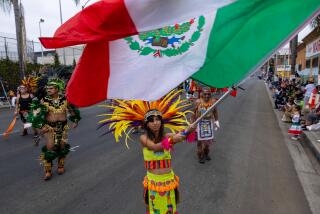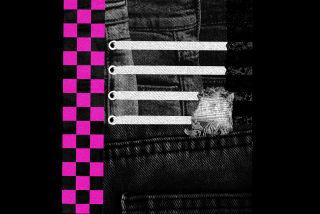Op-Ed: Cinco de Mayo -- a truly Mexican American holiday
- Share via
Thanks to a recent ruling from the U.S. 9th Circuit Court of Appeals, high school students in the Morgan Hill Unified School District south of San Jose won’t be allowed to wear American flag T-shirts on Cinco de Mayo. That’s too bad. The flags of both the United States and Mexico belong in any celebration of Cinco de Mayo, because it is, at its heart, a Mexican American holiday.
The ban was instituted a year after hostilities broke out at Live Oak High School during a Cinco de Mayo celebration. At the event, a group of primarily Mexican students carrying a Mexican flag were confronted by a group of primarily Caucasian students, who hoisted a makeshift American flag and began chanting “USA! USA!”
But the prohibition and the subsequent court ruling — like the students and school administrators involved in the dispute — don’t understand the essence of the holiday.
OPINION L.A. BLOG: Mexican flag, si; American flag, no?
If you were to go to Mexico on May 5 and try wishing Mexicans a “Happy Cinco de Mayo,” you’d be greeted by puzzled looks. The holiday is virtually not celebrated south of the border.
Instead, Cinco de Mayo has its roots in the dark, early days of the American Civil War. A year into the conflict, it appeared that the Southern slave states might prevail in their efforts to keep African Americans in slavery based on notions of white supremacy.
The Confederacy had expanded into New Mexico and Arizona, and hoped to get all the way to Los Angeles. For tens of thousands of Latinos in the American West, slave territory was moving uncomfortably close. Even as the Union Army in the Eastern United States seemed paralyzed, fearful of moving decisively against the Confederates, numbers of California’s Latinos joined the U.S. Army and organized units of Spanish-speaking cavalry in California and unoccupied portions of New Mexico.
Though France didn’t take an official side in America’s Civil War, sympathetic banks in France were underwriting the Confederate dollar. And Napoleon III of France, knowing the U.S. was too involved in its own crisis to object, sent troops into Mexico in 1862, seeking to overthrow that country’s democratic government, which had abolished slavery 50 years earlier.
Napoleon’s forces were decisively beaten by the Mexican army at the Battle of Puebla on May 5, 1862, however, and had to withdraw to strongholds along the coast of Mexico. News of the Mexican victory arrived in California around the same time as news of the Union Army’s defeat in the Seven Days Battles.
Latinos celebrated the good news from Mexico by parading through the streets of towns in California and Nevada, proclaiming their stance both on the American Civil War and on French Intervention in Mexico. They opposed slavery, white supremacy and government by privileged elites in both the United States and Mexico. They supported freedom, racial equality and democracy.
In all those first parades, the revelers carried the U.S. flag and the Mexican flag side by side; they sang both “The Star-Spangled Banner” and the “Himno Nacional Mexicano.” In Los Angeles, San Francisco, San Jose, Sacramento, Marysville, Stockton, Sonora, Virginia City, Nev., and elsewhere, both the U.S and Mexican flags led the way for those who supported freedom, racial equality and democratic government.
When Abraham Lincoln ran for reelection in 1864, amid fears he would be rejected after four years of bitter war, Latinos rallied votes for the Great Emancipator with campaign announcements proudly featuring the two flags, of the U.S. and Mexico.
Cinco de Mayo was made in America, by Latinos who proudly bore the U.S. and Mexican flags to show their support for both the Union and its values and for the Mexican victory over the French, who sought to undermine those values.
If the Morgan Hill Unified School District and the court had known more American history, the sad affair that pitted one community against another might have been avoided. Let’s not repeat that set of mistakes.
David E. Hayes-Bautista is a professor of Medicine at UCLA’s David Geffen School of Medicine and the author of “El Cinco de Mayo: An American Tradition.”
More to Read
A cure for the common opinion
Get thought-provoking perspectives with our weekly newsletter.
You may occasionally receive promotional content from the Los Angeles Times.










